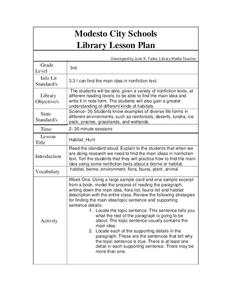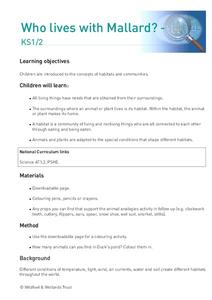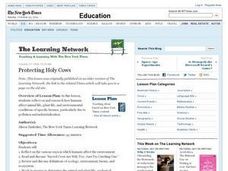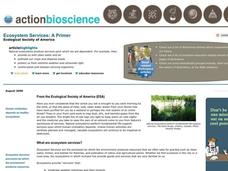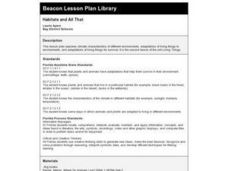Curated OER
Wild and Wetlands
Upper graders identify the major characteristics of a wetland. They explore the human factors that change a wetland and write a descriptive paragraph about wetlands. This comprehensive lesson also has an interactive "Watershed Game"...
Curated OER
Hands on Habitat
Students teach others about habitats. In this Science lesson, students use a Science Log to record data about a habitat for research. Students analyze the data and construct an eco-chamber. Students share what they have found with other...
Curated OER
Wetland Habitats
Eighth graders explore the program Alice and the Internet to research wetland habitats. In this habitat lesson students build their own Alice world that includes wetland habitats, food sources and ways to protect the habitats.
Curated OER
Wetland Wonders
Learners describe the characteristics of wetlands. They demonstrate their understanding of the importance of wetlands to humans and wildlife and determine they are defined by the presence of water, and specialized soils.
Curated OER
Habitat Hunt
Third graders read several nonfiction texts and practice finding the main idea for the text as well as learn about various habitats. In this main idea lesson, 3rd graders read several nonfiction texts and make habitat cards. Students...
Curated OER
Dirty Mud
Learners examine geological information to study benthic marine habitats. In this watershed project, students examine wetland habitats and land uses in a watershed. They will use geological information to discuss the impact of pollution...
Curated OER
Jumanji
Third graders read the book, Jumangi. Then they divide into groups of four or five and choose a habitat - desert, wetlands, Arctic/Antarctic, etc. Then each group can research the habitat to learn what kind of animals live there.
Curated OER
Who lives with Mallard?
Students explore how all living things have needs that are obtained from their surroundings. They identify the surroundings where an animal or plant lives is its habitat. Students identify that a habitat is a community of living and...
Curated OER
Environment: Assess Your Habitat's Health
Students research their ecozone in Canada and label on maps various parks and wildlife areas. They role-play as doctors with their ecozones as patients and search for symptoms from pollution, urbanization, loss of habitat, and decline of...
Curated OER
Saving Habitat
Students pick an animal native to Maryland and research how populations of that animal might be affected by land use changes over the past thirty years. They predict population trends for the next thirty years.
Curated OER
Cypress/Tupelo Swamps
Young scholars study the geologic history of terrain, soils, and drainage patterns. They recognize ecological processes that determine the dynamic nature of habitats. They investigate the influence of human activity on the landscape.
Pennsylvania Department of Education
Animal Classes and Their Ecosystems
Young scholars explore animal characteristics by participating in an environment identification activity. In this animal habitat lesson plan, students discuss a range of different wild life and the ecosystems that they are a part of....
Curated OER
Protecting Holy Cows
Students study the interrelationships of organisms and their environments. They study ecological communities and determine what is necessary for survival. Students discuss and answer questions concerning a group's biome, habitat, food...
Curated OER
Why Do Geese Fly South For the Winter?
Fifth graders examine migration by tracing animal migration routes on a map. In this animal life lesson, 5th graders observe a map of North America and read about the migration patterns of geese. Students trace the path most geese take...
Curated OER
Getting to Know Some of Pennsylvania's Fishes
Students research and identify the fish of Pennsylvania. For this earth science lesson, students view ten photos of fish and identify the characteristics of each fish. Students record observations and practice naming the fish using their...
Curated OER
Parasite Development and Life Cycle
If you are new to teaching agriculture classes, this outline may be helpful when you are preparing a lecture on parasites in livestock. In addition to lecturing on this topic, the lesson plan suggests that learners research the life...
Curated OER
Data Analysis: bird habitats in rice farms
Fifth graders make a graph and write an essay to interpret the data of birds that take advantage of habitats near rice farms. In this data lesson plan, 5th graders calculate the information given to them and interpret it in an essay form.
Curated OER
Milkweed and Monarch Butterfly Mania
Students explore Earth science by completing a worksheet in class. In this botany lesson, students identify the relationship between the Milkweed plant and the butterflies which regularly feed on its nutrients. Students visit a list of...
Curated OER
How Much Is an Ecosystem Worth?
Students examine the value of ecosystems. They read and analyze an article, evaluate ecosystem services, research the benefits of biomonitors, and design a public service announcement.
Curated OER
Water and Rice Agriculture
Second graders investigate the agriculture of rice by reading a study guide. In this food making lesson plan, 2nd graders read about the irrigation of rice fields used for harvesting. Students write three sentences about the rice...
Curated OER
Frogs: Fact or Folklore
Middle schoolers discover how frogs are adapted to their environment. They view and discuss a Discovery Channel video on frogs and the myths surrounding frogs. In small, groups they compile data on frogs from the internet to create a...
Curated OER
Investigating Fresh Water Ecosystems
Sixth graders examine the fresh water ecosystems. In this environmental instructional activity, 6th graders work in groups to collect information about a fresh water ecosystem and report their findings to the class in the form of a...
Curated OER
Habitats and All That
First graders read books, complete online explorations and discuss the ways in which animals adapt to their habitats in order to survive. They create accordion books, play matching games and dramatize animal adaptations.
Curated OER
Is Urban Sprawl Causing Us To Lose More Than Ground?
Young scholars map the changes that occur in the land as a result of urban sprawl. They explore the problems that paving and building have on the watershed and the habitats on the Northshore.






